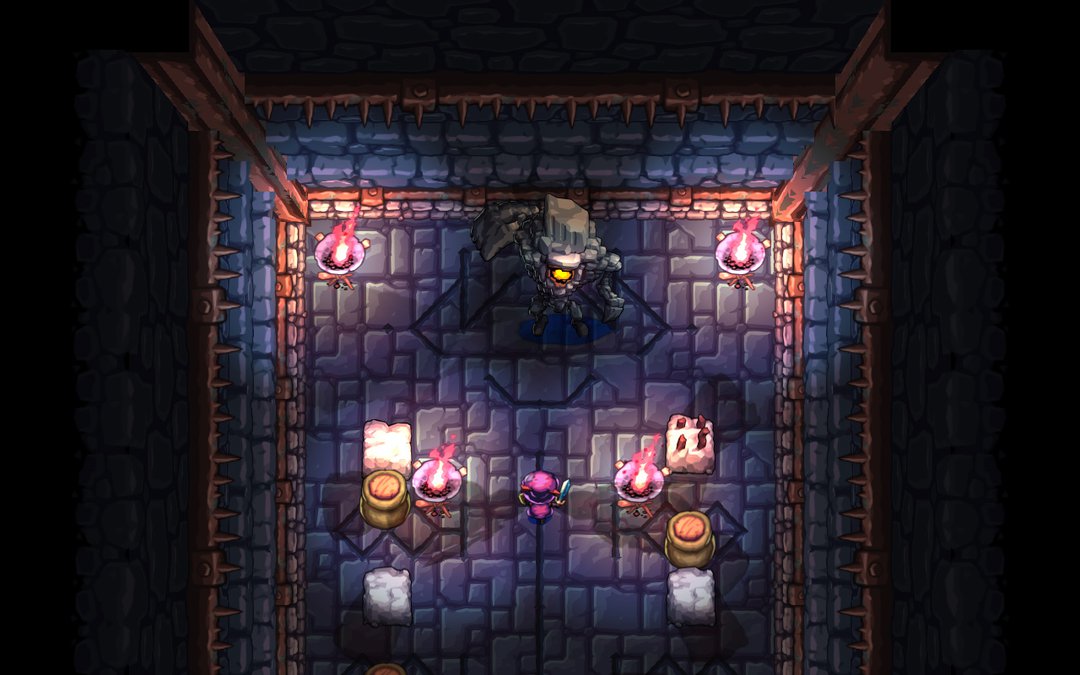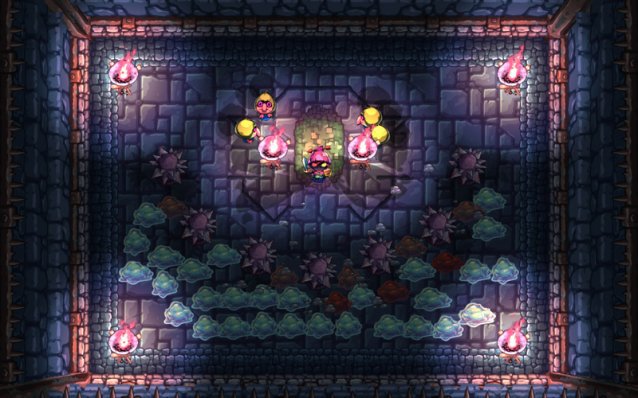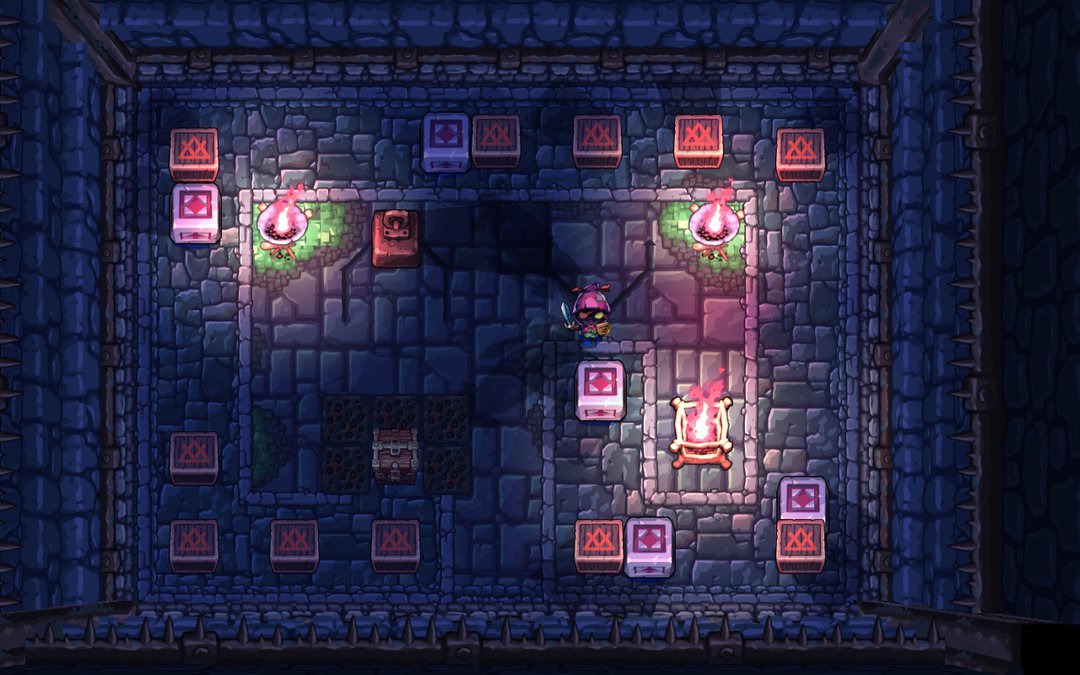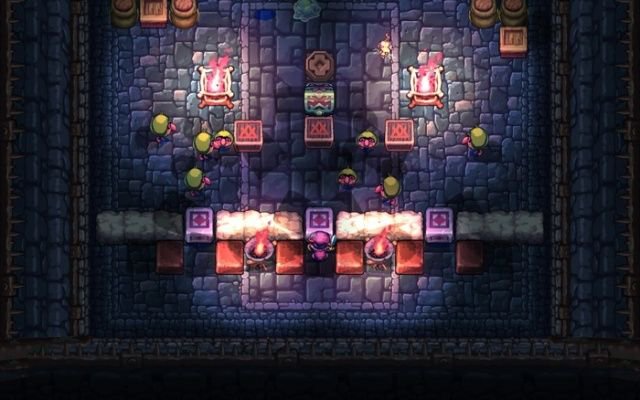Delver's Drop
Developer: Pixelscopic
I discovered Delver's Drop at PAX East earlier this year, and it was definitely one of my favorite games of the show. I recently had the opportunity to ask the developers at Pixelscopic about the game via email, and they were nice enough to take some time out of their busy dev schedule to answer them. Read their answers below, and keep an eye out for news on Delver's Drop here in the future!
Sprites and Dice: How did you go about setting a specific goal for Kickstarter, and what things needed to be considered for that budget? Did getting funded allow you to work on the game full time, or was it mostly needed for things like hardware to test on and events like PAX?
Pixelscopic: We looked at how much time and manpower we would need to complete the game, and set an estimated budget based on that. We also looked at and compared a lot of similar Kickstarter campaigns to gauge how much funding we thought Delver's Drop would be able to bring in. And yes, the funding has allowed us to work on the game full time - but we've also had to buy some additional hardware and software. Getting funded above and beyond our goal has given us a lot of flexibility to bring in a few more contractors and provide them with computers so that we can create more content than if we had been funded for less.

SnD: Will the game be similar on mobile/Ouya vs on PC? Are there any technical limitations on one platform that you have to consider on the other?
Pixelscopic: It should actually be identical, less a few of the more elaborate particle effects, and some control differences. Since we've developed our own engine in-house, we can port the game verbatim to another platform like iOS or Android - but translating the engine to these platforms takes time. When designing the game, we do consider all of the platforms it will be on and try not to do things like over-complicated control schemes that won't translate to the touch screen.
SnD: Each of you seem to have a very specific role in the team. Could you go into what part each of you play in the creation of the game? What backgrounds do you guys come from?
Pixelscopic: The easiest summary of our roles is that Coby does the programming, Baker does the illustration and directs the art and animation, and Burrell handles the scripting, implementation, and level design. We all work on the game's design in various ways.
Here are our official bios:
Coby Utter Co-Founder, CEO, Engineering Director

Coby manages the long term technology vision for Pixelscopic and oversees business development and administration. Coby started college on a baseball scholarship and was in pharmacy school for a while, but after spending all of his evenings teaching himself game development he switched his major to computer science. He spent several years as a Lead Programmer and later Programming Director at another game company before going independent. He worked on an original casual game while living in Mexico in 2009, and returned to the U.S. to start Pixelscopic in 2010. Coby has a strong interest in entrepreneurial experimentation and is driven by a fast, flexible, and user-friendly approach to game technology. On a daily basis he is the driving force for both our company’s cross-platform engine and our gameplay programming foundations. He remains active on independent game development forums, keeps an eye out for interesting indie RPGs, and has dreams of rebuilding his SNES collection.
Ryan Baker Co-Founder, CCO, Vision Director

Ryan (aka “Baker”) is the creative leader behind the company’s conceptual and aesthetic vision, and was a graphic designer and painter before he moved to game development. He originally studied painting and graphic design in college, and then started as a pixel artist and sprite animator at his former employer before rising to the roles of Lead Artist, Lead Designer, Art Director, and Creative Director on a number of projects. Going independent in 2010, he shortly thereafter teamed up with Coby to found Pixeslcopic with his experience in game direction and project management, and his passion for artistry. Ryan’s constant goal is to design nuanced yet tightly constructed and edited games, and to expand Pixelscopic’s artistic process with techniques from his background in fine art and illustration, graphic design, and traditional animation. Ryan continues to grow his large and varied archive of games and gaming ephemera, plays the drums and dabbles in guitar, and is also our resident spreadsheet wizard.
Ryan Burrell Director of Technical Design

Ryan (aka “Burrell”) serves as a jack-of-all-trades contributing in the areas of game design, visual production, user interfaces, scripting, and level design. His background is primarily in web development and design, so he also serves Pixelscopic’s resident web technology expert and manages our social media communications. Ryan has occupied a variety of different roles throughout his career ranging from technical support specialist, to developer, to graphic designer, and has worked in industries ranging from ISPs and e-commerce to boutique design and branding. He joined the Pixelscopic team in early 2011 and cut his teeth on their first Nintendo DS project. Ryan strives to stay abreast of current trends and methodologies in the tech and entertainment sectors and maintains eclectic gaming interests. He still makes it a point to play with LEGOs in his free time and can be found most Friday nights fumbling through a D&D 3.5 session — these two activities often occurring at the same time.

Note the dynamic lighting here: shadows form from multiple light sources and move with character animations.
SnD: What did Pixelscopic do before Delver's Drop? Have you learned anything from past experiences that have shaped the direction of this game?
Pixelscopic: We did a lot of contract work, and co-developed / designed the two Moshi Monsters DS games for Mind Candy (based on the online flash game). Coby and I had a lot of DS experience before that, and I think that both that and our game playing roots in the SNES/Genesis era have given us a love of 2D game aesthetics - hence our goal to make Delver's Drop (and all of our games) amazing 2D experiences.

SnD: Can we expect a large story from the game, or is it going to be more like Spelunky and The Binding of Isaac, with gameplay at the forefront?
Pixelscopic: We will have more story than the two games you mentioned, but action-based gameplay is still the focus. We'd like to introduce some "ambient narrative" - so that you stumble upon some NPCs or objects that give you pieces of the backstory for the world as you progress. We will also have several different story endings based on the player's choices.
SnD: One thing people don't really see from screenshots of the game is how complex the physics and lightings systems are. Is there anything you'd like people to know about how the game works? Common misconceptions you'd like to correct?
Pixelscopic: I'm not sure if there are any misconceptions, but I'm pretty positive that no one realizes just how complex the physics and other effects actually are. Every character, enemy, weapon, and object has so many scripted parameters and variables, it's a little insane. There's a lot of room for flexibility and creativity in the system, but we have to rein things back sometimes to make the experience more in line with players expectations, and what is easy for the player to control. For example, the first version of the Sorcerer was super floaty and hard to handle, so we've tightened up his physics quite a bit. But we want the physics to factor heavily into the weapons system and combat experience, to the extent that you could find some weapons that do crazy things like knocking enemies across the room with the mild tap of a magical staff.

Those explosive crates can send enemies - and you - flying.
SnD: If the game sells well enough, is it likely we'll see some of those stretch goals as DLC, or even a console port?
Pixelscopic: We would very much like to do an expansion with more levels and characters if the game does well enough to justify it. A console port is also possible, but we'll most likely wait until sometime in 2014 and see how things are going after we release the mobile versions before considering it.
SnD: Anything else you'd like people to know about the game?
Pixelscopic: Well we're currently #11 on Steam Greenlight, so we'd appreciate a few more votes to bump us up into the top 10! We'd also love to see everyone at PAX Prime at the end of this month. We'll announce our booth number and location soon, but just know that it will be a bigger and better show this time around!
Thanks to Pixelscopic for taking the time out to answer our questions. If you've got a question you'd like to ask, join the Pixelscopic Forums. The developers have been really open about the process of making this game, and it's definitely fun to hear so much from them. Be sure to also follow Pixelscopic and Delver's Drop on Facebook, as well as on both of their Twitter accounts. I'll be posting my impressions with the game as the Alpha builds come out, so be sure to look out for those as well!